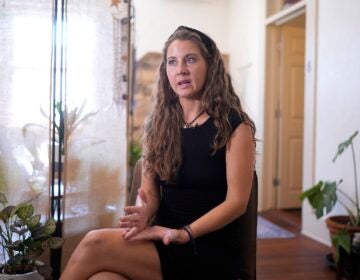The ‘baby penalty’ often sidelines female scientists
Listen
Bioengineer Nancy Pleshko ordered takeout from an Italian restaurant on her way from her lab at Temple University to her home in Cherry Hill, New Jersey. This is what she and her two teenage children at home have for dinner around once a week, to save time. (Emma Lee/WHYY)
Married women scientists with children are less likely to get a tenure track job than married men with children.
Nancy Pleshko, a mother of three, leads a bioengineering lab at Temple University. These days she has some flexibility and control in her schedule, but 19 years ago, when she was a young assistant scientist, she didn’t even stop working while she was on leave with her newborn daughter.
“I was having lab meetings every week on the phone, and even once or twice had … students … lab techs to my house for lab meeting,” she says.
“I can … remember so many times walking around my house with my daughter in the baby sling, and being on the phone.”
Before she went on maternity leave with her oldest daughter Marisa, she had one last thing to finish up.
“I was writing a grant and on the way to the hospital,” Pleshko says.
And before she was admitted to labor and delivery she dropped the application off at FedEx.
“That’s your life when you’re a scientist in academia,” Pleshko says.
Pleshko climbed the career ladder as a mom, and she credits her to success to many things, including good child care and having a supportive supervisor who was also a mother.
But it doesn’t always work out for scientists who want to be mothers.
Kelly Ward, a professor of educational leadership at Washington State University, interviewed more than 100 mothers at different stages of their academic careers and recorded their experiences.
She remembers one scientist who had two children and wanted a third.
“She felt like, ‘I already took two leaves, it’s not great timing,'” Ward remembers.
That woman put off having a third child, but, when everything was finally in place, she felt like she was too old to have another child.
“There’s a lot of anecdotal information about people regulating how many children they have to accommodate their academic career,” Ward says.
Ward interviewed another scientist who went on maternity leave twice and faced backlash from her colleagues when she made tenure.
“Then there was a lot of conversation about, ‘She had all that extra time. If I had extra time, I’d be successful too,'” Ward says.
Mary Ann Mason, a law professor at the University of California, Berkeley, calls it ‘the baby penalty.’
She says science is often a tough, inflexible work culture. If women take time off to have children, male counterparts sometimes see them as being less productive scientists.
Mason’s research shows that married female scientists with children are 35 percent less likely to get a tenure track position than married men with children. Even after getting a tenure track job, women are 27 percent less likely than married men with children to get tenure.
“It’s brutal,” Mason says. “I’m afraid, probably even still, most men do not consider women scientists if they drop out of the workplace for six months or a year or whatever, or have a child.”
Mason says this is a major reason why we don’t have more women in academic science.
She helped identify the problem and is pushing for solutions. As a result of her research, California passed a law requiring colleges and universities to have written policies against pregnancy discrimination.
Mason says the change has already paid off for University of California, Berkeley.
She was speaking to a young neuroscientist who’d recently been hired as a professor along with his wife.
Mason recalls, “I said, ‘Why did you come to Berkeley rather than MIT?’ He said, ‘They were also offering the same thing. I came here because you have family friendly policies.’ Wow.”
But Mason says offering paid parental leave is not enough.
Lisa Hughes has two sons, age 7 and 9. She says, for her, good child care has been key to staying on track and pursuing her goals in science.
Child care is not cheap.
“Oh God, yeah, and I was doing it in Maryland, and it was so expensive,” Hughes says. “We didn’t have a lot of money, we still were recovering from debt that I had while I was in grad school … and then you have a kid, so we … basically had a no frills life.”
As her children got older, that no frills life made it hard to pay for movies and arcade games for her kids.
Ultimately Hughes chose a career in private industry doing drug development. The job is more stable, and she’s not chasing down grants to get her research funded.
Workforce researcher Kelly Ward from Washington State says schools and labs should consider training professors and managers on ways to support students with children.
“Higher education has a real history that professors are trying to … remake their students in the likeness of their image. Well that’s really hard if you have a young woman and she’s working with an elderly man who never had children.”
WHYY is your source for fact-based, in-depth journalism and information. As a nonprofit organization, we rely on financial support from readers like you. Please give today.







